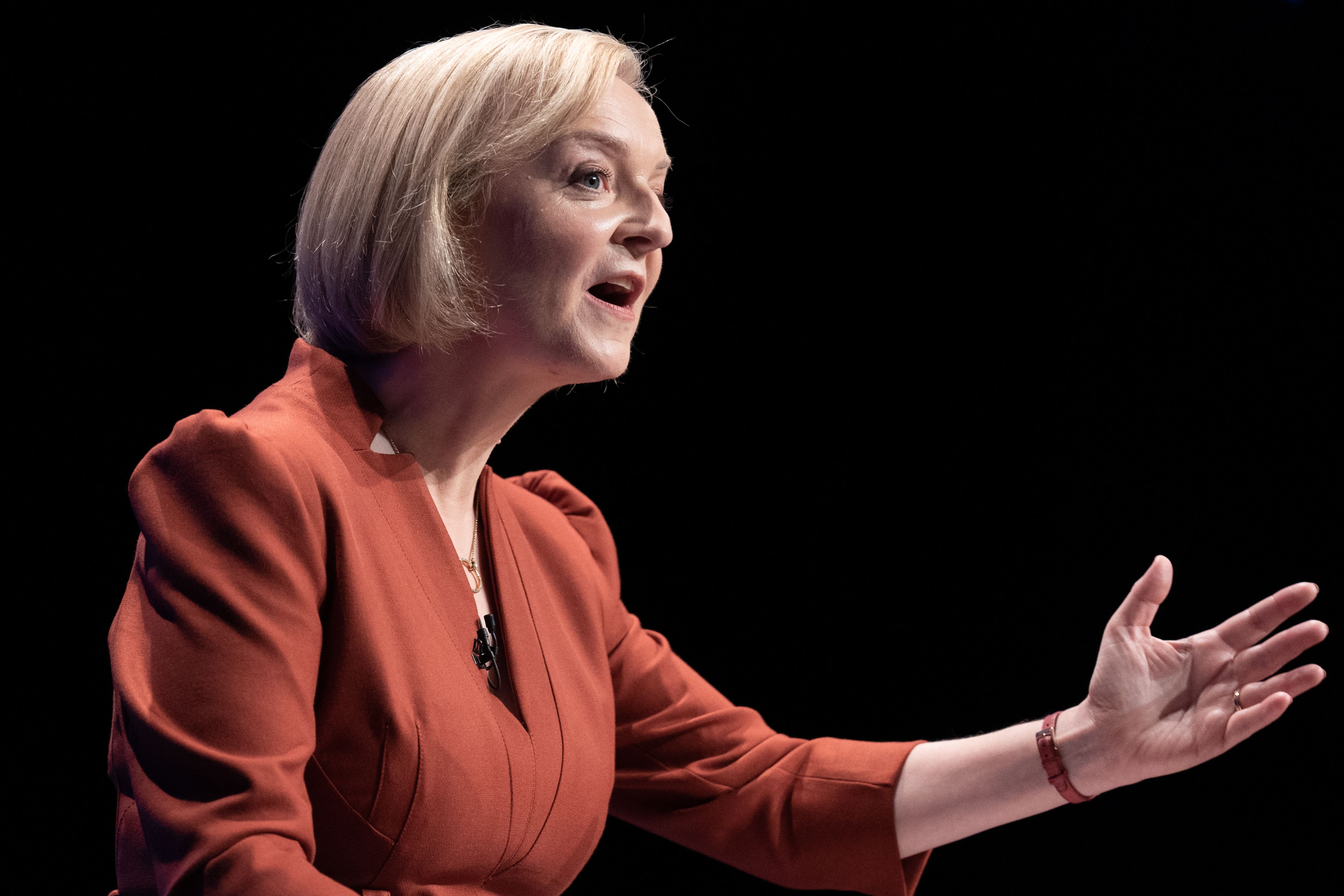Truss urges West to reduce reliance on China as Beijing hits out at Taiwan visit
The former PM said Western leaders should not work with China, warning that totalitarian regimes ‘don’t tell the truth’.

Your support helps us to tell the story
From reproductive rights to climate change to Big Tech, The Independent is on the ground when the story is developing. Whether it's investigating the financials of Elon Musk's pro-Trump PAC or producing our latest documentary, 'The A Word', which shines a light on the American women fighting for reproductive rights, we know how important it is to parse out the facts from the messaging.
At such a critical moment in US history, we need reporters on the ground. Your donation allows us to keep sending journalists to speak to both sides of the story.
The Independent is trusted by Americans across the entire political spectrum. And unlike many other quality news outlets, we choose not to lock Americans out of our reporting and analysis with paywalls. We believe quality journalism should be available to everyone, paid for by those who can afford it.
Your support makes all the difference.China has hit out at Liz Truss’ visit to Taiwan, calling it a “dangerous political show”, as the former prime minister used a speech to urge the West to reduce its “dependence” on Beijing.
Ms Truss told a think tank audience in Taipei City on Wednesday that Western allies must learn the lessons from the international fallout after Russia’s invasion of Ukraine by taking steps to prepare for sanctions against China in the face of its aggressive stance towards Taiwan.
Taiwan and China split in 1949 following a civil war that ended with the Communist Party in control of the mainland.
The island has never been part of the People’s Republic of China, but Beijing says it must unite with the mainland, by force if necessary.
In a speech to the Prospect Foundation, Ms Truss said the West needed to “reduce dependence on China in all spheres”.
She continued: “If Beijing keeps its word and escalates aggression towards Taiwan, substantial decoupling will be unavoidable.
“If we fail to prepare for this, the consequent economic pain will be felt by all of our people across the free world.
British politician Liz Truss’s recent visit to Taiwan is a dangerous political show which will do nothing but harm to the UK
“I know that when we first put sanctions on Russia when I was foreign secretary, there was a lot of resistance from organisations in the UK who were deeply embedded already with Russia.
“We need to be on the lookout for that with respect to China and take action now to make sure we’re prepared.”
She also argued against working with China on global issues such as climate change, warning that totalitarian regimes “don’t tell the truth” as she pointed to Beijing’s treatment of Hong Kong and the regime’s secrecy during the Covid-19 pandemic.
Before Ms Truss stood up to make her speech, the Chinese embassy to the UK issued a statement warning that Ms Truss’ speech would “harm” Britain, labelling it a “provocative move”.
It urged her to stop defending Taiwanese independence or else “further expose herself as a failed politician and get more backlash from the Chinese people”.
“British politician Liz Truss’s recent visit to Taiwan is a dangerous political show which will do nothing but harm to the UK,” an embassy spokesman said.
“Any violation of the one-China principle will have serious consequences for China-UK relations.”
The UK’s integrated review needs to be amended to state clearly that China is a threat
Beijing has been known to retaliate after Western politicians visit the self-governed Pacific island.
After Nancy Pelosi, then-speaker of the US House of Representatives, visited Taiwan last year, China staged a naval and air force blockade of Taiwan, cutting off channels of communication with Washington on issues from environmental protection to maritime security.
However, Ms Truss argued that Western allies cannot avoid responding to Chinese aggression out of fear of a new Cold War because Beijing is already expanding its military.
During her speech, she also challenged Prime Minister Rishi Sunak to deliver on the language he used during last summer’s Conservative Party leadership contest.
During his unsuccessful campaign, having only become Britain’s leader in October after Ms Truss exited No 10 following her disastrous mini-Budget, Mr Sunak declared China “the biggest-long term threat to Britain”, while also promising to close all 30 of Beijing’s Confucius Institutes in the UK.
The institutes promote Chinese culture on campus in higher education as well as in some British schools.
“He was right and we need to see those policies enacted urgently,” said Ms Truss.
“The UK’s integrated review needs to be amended to state clearly that China is a threat.
“Confucius Institutes should be closed down immediately.”
During her brief time as prime minister, Ms Truss was widely expected to move the UK Government on to a more hawkish footing when it came to dealings with Beijing, wanting to declare China under Communist Party rule a “threat” to national security.
However, her stint in Downing Street — cut short to only 44 days after her mini-budget impact on the markets last year saw confidence in her premiership collapse — meant her update to the UK’s foreign policy position did not have time to materialise.
Instead, her successor Mr Sunak chose not to go as far, updating the UK’s integrated review on foreign and defence policy in March to describe China as representing an “epoch-defining and systemic challenge”.
Ms Truss’ visit to Taiwan is thought to be the first by a former British prime minister since Margaret Thatcher made the journey in the 1990s.